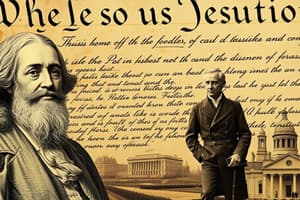Podcast
Questions and Answers
Which of the following accurately reflects Montesquieu's idea of separation of powers?
Which of the following accurately reflects Montesquieu's idea of separation of powers?
- The government should be divided into legislative, executive, and judicial branches, each with distinct powers. (correct)
- Government should be based on the will of the majority, regardless of individual rights.
- A single, all-powerful ruler should be in charge of government.
- The people should have the power to directly make all laws.
According to John Locke's theory of natural law, what are individuals entitled to?
According to John Locke's theory of natural law, what are individuals entitled to?
- The right to unlimited wealth and property.
- The right to disobey any law they deem unjust.
- The right to rule over others based on their social status.
- The right to freedom of religion and conscience. (correct)
Which of the following best describes John Locke's concept of the social contract?
Which of the following best describes John Locke's concept of the social contract?
- A document outlining the specific rights and obligations of citizens.
- An agreement between the government and its citizens, where citizens give up some rights in exchange for protection. (correct)
- A system where rulers are chosen by the people to represent their interests.
- A contract between individuals, where they agree to cooperate and share resources.
Which Enlightenment thinker's ideas most directly influenced the structure of the United States government?
Which Enlightenment thinker's ideas most directly influenced the structure of the United States government?
How did Enlightenment ideas like natural law and social contract theory influence the Founding Fathers?
How did Enlightenment ideas like natural law and social contract theory influence the Founding Fathers?
Which of the following is NOT an example of how Enlightenment ideas influenced the U.S. Constitution?
Which of the following is NOT an example of how Enlightenment ideas influenced the U.S. Constitution?
What is the main purpose of the principle of separation of powers?
What is the main purpose of the principle of separation of powers?
How does the idea of popular sovereignty relate to the principles of democracy and consent of the governed?
How does the idea of popular sovereignty relate to the principles of democracy and consent of the governed?
Flashcards
Federalism
Federalism
The division of power between national and state governments.
Democracy
Democracy
A system of government where the majority rules.
Representative Democracy
Representative Democracy
A type of democracy where people elect representatives to make decisions.
Majority Rule
Majority Rule
Signup and view all the flashcards
Popular Sovereignty
Popular Sovereignty
Signup and view all the flashcards
Rule of Law
Rule of Law
Signup and view all the flashcards
Checks and Balances
Checks and Balances
Signup and view all the flashcards
Judicial Review
Judicial Review
Signup and view all the flashcards
Study Notes
EOC Review Packet
- The EOC is based on 37 benchmark standards
- The packet reviews each benchmark and asks key questions and vocabulary
- The packet is connected to a PowerPoint with review questions after each section
- Students need to take notes on the packet by hand
- Students will complete the homework assigned in the packet
- Students are responsible for completing the packet's work if absent.
Major Principles of the Constitution
- Federalism: Division of power between the national and state governments
- Democracy: Rule by the people
- Representative Democracy: Citizens elect representatives
- Majority Rule: Decisions made by more than half of the voters
- Popular Sovereignty: Government power comes from the people
- Rule of Law: No one is above the law
- Limited Government: Government's power is restricted
- Separation of Powers: Division of government powers among three branches
Enlightenment Ideas
- Montesquieu's Separation of Powers: Division of government powers into three branches (legislative, executive, judicial)
- Locke's Natural Law: Natural rights (life, liberty, property) are inherent and cannot be taken away
- Locke's Social Contract: Government's legitimacy comes from the consent of the governed. People agree to give up some freedoms for protection from the government.
Studying That Suits You
Use AI to generate personalized quizzes and flashcards to suit your learning preferences.




